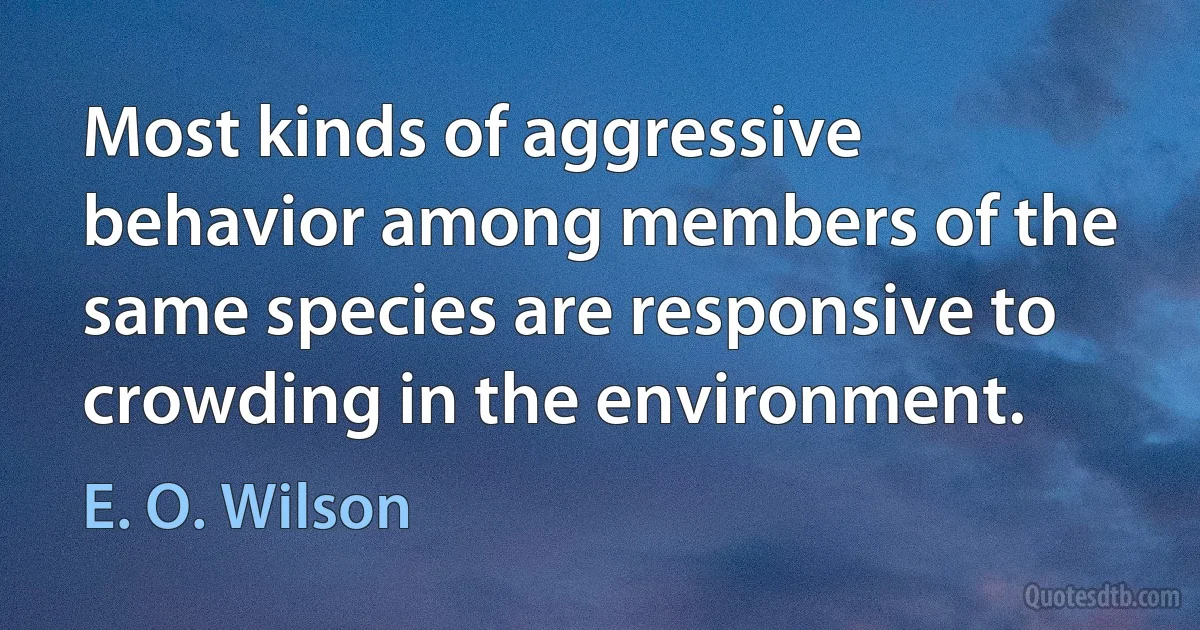Crowding Quotes
I know every numbskull will babble on about "black man," "maneater," "chance," and "retrospective interpretation," in order to banish something terribly inconvenient that might sully the familiar picture of childhood innocence. Ah, these good, efficient, healthy-minded people, they always remind me of those optimistic tadpoles who bask in a puddle in the sun, in the shallowest of waters, crowding together and amiably wriggling their tails, totally unaware that the next morning the puddle will have dried up and left them stranded.

Carl Jung
As is often the case with major disputes in economics, the argument over fiscal policy went on for years, with some critics of fiscal policy still defending their position when this book went to press. It seems fair, however, to say that among economists a more or less Keynesian view of the effects of fiscal policy came to prevail. Careful statistical studies at the International Monetary Fund and else where showed that austerity policies have historically been followed by contraction, not expansion. Recent experience, in which countries like Spain and Greece that were forced into severe austerity also experienced severe slumps, seemed to confirm that observation. Furthermore, it was clear that those who had predicted a sharp rise in U. S. interest rates due to budget deficits, leading to conventional crowding out, had been wrong: U. S. long-term interest rates remained near record lows even during the years from 2009 to 2012, when the government ran very large deficits.

Paul Krugman
But further analysis and experience soon raised doubts about the efficacy of these new tools. Empirical research indicated that the Keynesian multiplier was much smaller than earlier analyses had assumed, reduced by a crowding out of interest-sensitive spending caused by an induced increase in the demand for money and by the effect of the larger national debt on long-term interest rates. The leakage of demand through imports and the effect of the fiscal expansion on the exchange rate further reduced the multiplier.

Martin Feldstein
On the water, aboard the Proteus, the crowding, the activities, the tempo, of life in the cities, on the land, are muted, slowed-fictionalized-by the metaphysical distancing a few meters of water can provide. We alter the landscape with great facility, but the ocean has always seemed unchanged, and I suppose by extension we are infected with some feelings of timelessness whenever we set out upon her.

Roger Zelazny
In her book, Philosophy in a New Key, Susanne Langer remarks that certain ideas burst upon the intellectual landscape with a tremendous force. They resolve so many fundamental problems at once that they seem also to promise that they will resolve all fundamental problems, clarify all obscure issues. Everyone snaps them up as the open sesame of some new positive science, the conceptual center-point around which a comprehensive system of analysis can be built. The sudden vogue of such a grande ideé, crowding out almost everything else for a while, is due, she says, "to the fact that all sensitive and active minds turn at once to exploiting it. We try it in every connection, for every purpose, experiment with possible stretches of its strict meaning, with generalizations and derivatives.”.

Clifford Geertz
In Professor Pigou's study the argument that free enterprise lead to excessive investments in industry having relatively upward-sloping cost curves is developed with the aid of concrete example, the case of two roads; Suppose that between two points there are two highways, one of which is broad enough to accommodate without crowding all the traffic which may care to use it, but is poorly graded and surfaced; while the other is a much better road, but narrow and quite limited in capacity. If a large number of trucks operate between the two termini and are free to choose either of the two routes, they will tend to distribute themselves between the roads in such proportions that the cost per unit of transportation, or effective returns per unit of investment, will be the same for every truck on both routes. As more trucks use the narrower and better road, congestion develops, until at a certain point it becomes equally profitable to use the broader but poorer highway.

Frank Knight
Here where I lie is the hot pit
Crowding on the mind with coal
And the will turned against it
Only drills new seams of darkness
Through the dark-surrounding whole.
Our vivid suns of happiness
Withered from summer, drop their flowers;
Hands of the longed, withheld tomorrow
Fold on the hands of yesterday
In double sorrow.

Stephen Spender
As opposed to [megatechnics], an organic system directs itself to qualitative richness, amplitude, spaciousness, free from quantitative pressure and crowding, since self-regulation, self-correction, and self-propulsion are as much an integral property of organisms as nutrition, reproduction, growth, and repair. Balance, wholeness, completeness, continuous interplay between inner and outer, the subjective and the objective aspects of existence are identifying characteristics of the organic model; and the general name for an economy based on such a model is an economy of plenitude.

Lewis Mumford



